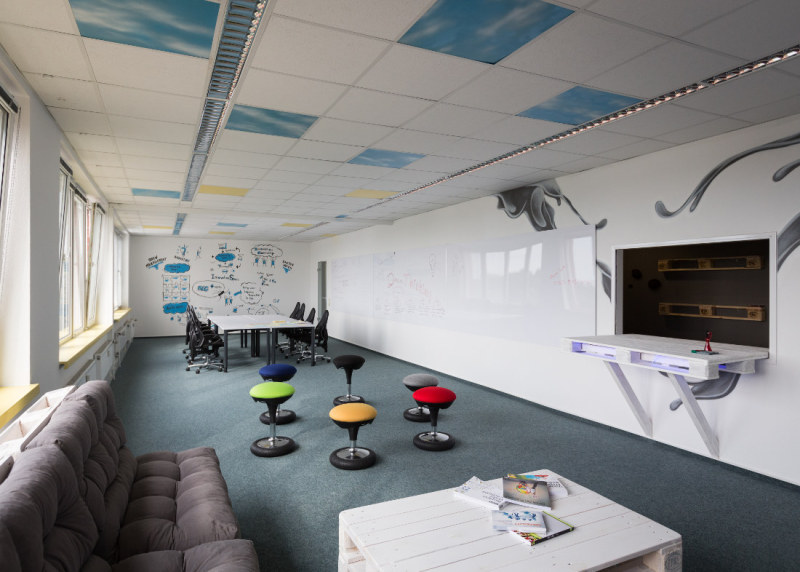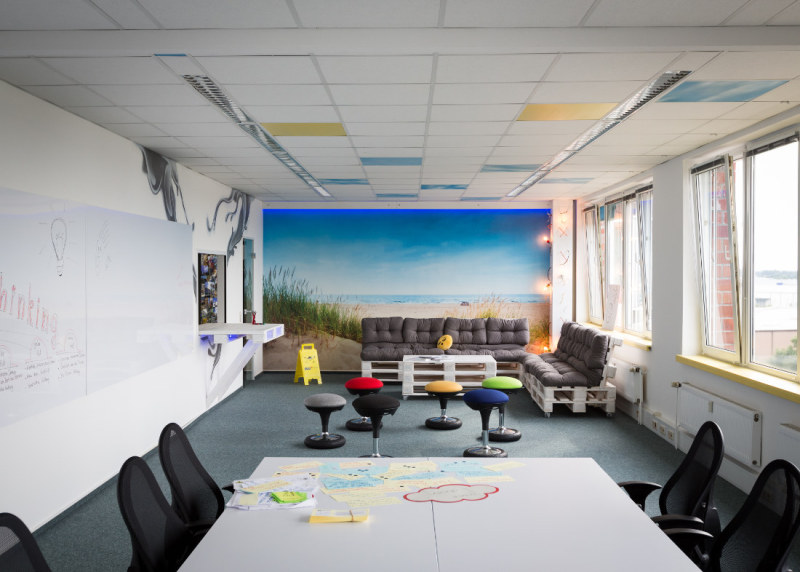Bremen over Berlin: how BLG’s Digilab is introducing a start-up mentality in this global company
Investing in BremenA real-world example of successful digitalisation at BLG Logistics Group

The digitalisation of logistics at BLG Logistics Group goes under the name of Digilab. Behind this think tank for digital ideas lies a sophisticated strategy that aims to prepare the company for the future. This is just one example of successful digitalisation in Bremen.
BLG’s central dispatch and administrative building appears a little humdrum at first: a plain 1960s brick tower block that stands alone at the entrance to Neustadt docks, near Bremen’s largest industrial area, the Cargo Distribution Centre (GVZ). It is surrounded by a large yard where lorries thunder by every minute, and most visitors would be surprised to find that a cutting-edge think tank is based here.
A look inside reveals colourful walls, furniture made out of pallets and moveable conference tables and chairs. Metaplan boards, walls and windows you can write on, and group rooms are all designed to encourage creative dialogue. “We want an atmosphere that promotes creative thinking. Anybody coming here should feel at ease,” says Homeier. The 33-year-old heads up Digilab, from where he coordinates the ‘100-day projects’ that are a key pillar of BLG’s digital strategy.
Digitalisation at BLG is based on needs
The other two pillars are the operational and the research projects, which both have the aim of putting innovations into practice. The 100-day projects, on the other hand, are more focused on harnessing new technologies. “We give a suggestion 100 days to produce something useful. This helps us to avoid projects that seemingly go on forever without concrete results. Especially in the case of new technologies, such as drones, we can quickly assess whether using them would bring benefits for BLG,” says Homeier. The company works with partners, often start-ups, on these short-term projects. The partners usually provide the technology. Homeier brings together an interdisciplinary team of employees from each department that can quickly assess the potential applications of new technology, and implement them.
If the prototype or pilot is successful, then it can be translated into an operational project. The departments then work on the rollout across the company and take care of the implementation. Even if a 100-day project fails, BLG stills views it as a success. “We learn something from every project and always look at what went wrong: Is it not scalable? Has the technology not been perfected yet? Based on our findings, we can consider trying again in a few years’ time,” Homeier explains. Digilab carries out four to six 100-day projects in parallel every year. Examples include drones for the inspection of storage depots and warehouses, agent-based order planning and digital freight documentation for paperless transport.
Creating an innovative community
BLG has set itself a specific digitalisation target: “If possible, we want to digitally map the entire logistics process, both horizontally and vertically, so that we can react more flexibly to our customers’ requirements and extend our portfolio of services,” says Piotrowski. The 42-year-old computer scientist heads up strategic business segment development for BLG’s contracts division and leads the interdisciplinary innovations team. “We’re on the lookout for new business models for the future, and are examining all technologies that come up, including autonomous robots, AI and assistance systems. In doing so, it’s important that we involve all our employees. The workplace of the future will be different, and we need to ensure that our staff have the tools they need to understand the new systems,” Piotrowski explains.
Involving employees in the innovation process also has the advantage for BLG of reducing resistance to the use of new technology. At Digilab, it is common for decision-makers to work alongside employees who are familiar with local processes. They can explore digital challenges together without having to consider the usual corporate hierarchies. “That’s why we based Digilab in Bremen, and not in Berlin. We wanted it to be at the heart of the group, not some isolated, external think tank,” Homeier says.

Ideas from every level
New ideas can come from all directions, most often from the top down, for example when the innovations team introduces new technologies to the department. But innovation can also come from the bottom up. Departmental employees can suggest ideas or describe problems that might be turned into a 100-day project.
Digilab celebrated its first anniversary in the summer of 2017. Piotrowski has gained important insights over the first year: “Good ideas and a strong network within the company provide the foundation, and we need to find the key personnel and bring them together, across all departments. This requires good communication at all hierarchical levels, as well as support from the board of management and other executives.” Digilab can certainly rely on this.
The two innovation managers and BLG’s innovations team have great plans for the future. They are hoping to refine methods and tools and establish a groupwide Innovation Community to produce a continual stream of new ideas. Of one thing they are both certain: digitalisation is no longer a project, it has become a permanent fixture in the company.
Lessons for SMEs
Although BLG is a large international logistics company, even smaller companies can learn plenty from BLG’s digital strategy. After all, important insights for successful digitalisation do not depend on the size of the budget or of the R&D department.
Here are the key lessons:
- Be brave and give it a go
- Test new technology in small projects that have a clear timescale
- Create spaces that encourage creative thinking and get employees out of the daily grind
- Involve employees from all hierarchical levels and integrate them into the project as early as possible - Secure support from the board of management
- Identify the key personnel across departments and bring them together in interdisciplinary teams
- Actively seek out customers and strategic partners in other sectors
- Make the most of communication channels and provide regular updates on the progress of digitalisation.
If you are interested in investing in Bremen from abroad, please feel free to contact Andreas Gerber, head of the international relocation team, +49 (0) 421 9600-123, gerber@bremen-invest.com
Success Stories
Bremen’s Economy in Figures: Statistics 2025
The State of Bremen is a strong economic hub. A look at the latest statistics highlights its economic strength — summarising key data such as cargo volumes, export performance, industry turnover, and more.
Learn moreMedium-Sized Companies in Bremen Showcasing the Full Range of the Local Economy
Medium-sized companies form the backbone of Bremen’s economy. They create jobs and produce goods that are in demand worldwide. Here is a selection of ten businesses that illustrate the diversity of Bremen’s economic landscape.
Learn moreTwelve international food and beverage companies in Bremen
Becks and Melitta may be high-profile brands, but international food and beverage companies also manufacture lots of other products in Bremen and Bremerhaven. Here are twelve examples.
Learn more
